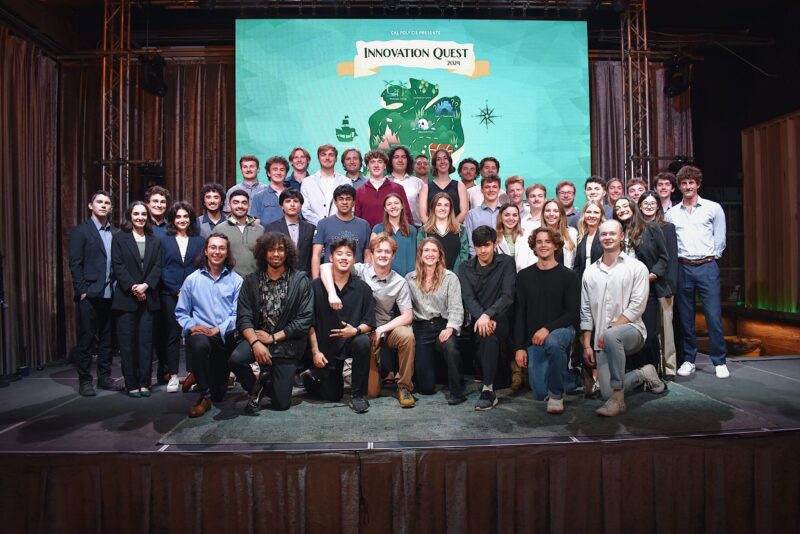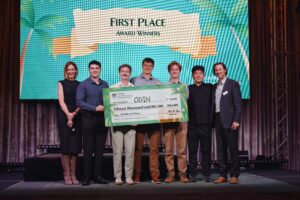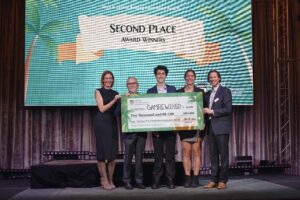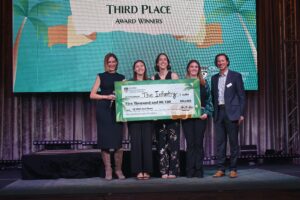Three Cal Poly Student Entrepreneur Teams Win Thousands For Their Innovative Startup Ideas at the CIE’s Annual Innovation Quest Competition

SAN LUIS OBISPO — Three student startup teams split $30,000 at the Center for Innovation and Entrepreneurship’s (CIE) annual Innovation Quest (iQ), a high-stakes competition where Cal Poly students pitch their innovative business ideas to a panel of judges in the hopes of winning funding for their startups. The entire day of pitches took place on April 27 on Cal Poly’s campus, with awards presented later at a local venue.
Taking home the first-place prize was ODIN, a portable headset with ocular tracking technology that rapidly and accurately diagnoses concussions. The winning team consists of industrial engineering senior Cory Garlinghouse of Scotts Mills, Oregon, biomedical engineering senior James Bell of San Diego, California, computer engineering senior Wilman Li of Tracy, California, economics senior Connor Heffler of San Diego, California, business administration junior Jeremy Tai of Los Angeles, California and business administration senior Jack Denger of Bellevue, Washington.
“Winning iQ meant a lot to me and my team because we’ve been putting in the work since January. This $15,000 will go a long way,” said CEO and co-founder of ODIN, Jeremy Tai.
They intend to use the cash prize to further develop ODIN and “make this company a reality,” said Tai.

The Rich & Jackie Boberg Innovation Award for second-place prize of $10,000 went to Gamrewired, a mobile app aimed at replacing a person’s gambling addiction with healthy habits, created by business administration seniors Austin Hatfield of San Clemente, California Camille Boiteux of San Francisco, California, as well as computer science and business administration senior Diana Koralski of Redmond, Washington. Gamrewired intends to participate in the Summer Accelerator program this year.
“It feels pretty good winning second place in iQ, but I think what means the most about this is that my best friend has a gambling addiction, so it gets us further to being able to help who we want to help. That’s the most valuable part of this experience,” said Hatfield, co-founder of Gamrewired.

Biomedical engineering seniors Rachel Rowe of Bellevue, Washington, Madeline Mumford of Snoqualmie, Washington, Jenna Eissmann of Reno, Nevada and Brittany Trinh of San Gabriel, California, received the third-place award of $5,000 for their startup The Infantry. The Infantry isa single-use device aimed to create a safer alternative for mothers and their infants during shoulder dystocia complications from vaginal births.
“I’m beyond thrilled to have this opportunity to develop my company. My team has already started talking about what we will do with the money and we are so excited to continue developing.” said co-founder Mumford.

Thirteen finalists pitched their innovative ideas in Cal Poly’s Nash Family Entrepreneurship Lab. The event’s banquet and awards ceremony were held at Rod and Hammer Rock later that evening.
Penny Lane Case, past iQ participant and CEO and co-founder of Nexstera Tech, spoke at the banquet about her experience in iQ, the Summer Accelerator program and her upcoming live pitch at AngelCon.
Nexstera Tech aims to shape the future with AI-driven radar technology by pinpointing lithium-ion battery risks within waste streams.
iQ was founded in 2004 by Cal Poly electrical engineering graduates and business leaders Carson Chen, Richard Boberg and Laura Pickering. Since its launch, iQ participants have received over $400,000 that has helped launch several successful businesses, such as iFixIt, Liftgator and Alydia Health.
“I was really impressed by all the teams today. It’s the first year since I’ve been here that, at the end of the day, I had no idea who was going to win. It was a great competition, really competitive and they did a great job,” said Dr. Thomas Katona, CIE Academic Director.
In addition to the three winners, 10 finalists were chosen from more than 50 applicants:
CSA Connect aims to streamline CSA (Community Supported Agriculture) research, is an easy-to-use commerce platform that builds a community connection between customers and local farms. CSA Connect received First Place in UX Fest for their mobile app, created by liberal arts and engineering studies senior Elena Kline of Seattle, Washington and graphic communication seniors Sierra Barnes of Orinda, California and Anjalie Shute of San Jose, California.
Ecoplasticity aims to redefine and replace plastic films with their marine biofilm for food packaging that has the ability to biodegrade within two months.. Ecoplasticity wascreated by Master’s of Business Administration student Mayela Fernandez Cantu of Monterrey, Mexico and material engineering senior Michelle Cullen of Redondo Beach, California.
GreenSight AI aims to revolutionize electronic resellers’ workflow by creating an AI (Artificial Intelligence)driven solution which provides Green Sight AI was created by general engineering senior Jake Daniels of Palo Alto, California, electrical engineering senior Evan Insley of Los Angeles, California, computer engineering senior Diego Curiel of Santa Barbara, California, computer engineering student Chris Lawson of Atascadero, California and business administration senior Mucio Martinez of Los Osos, California.
HeatShield Biometrics aims to aid in battle against wildfires by safeguarding wildland firefighters with alerts for impending heat stroke. HeartShield Biometrics was created by mechanical engineering seniors Stuart Austin of Portland, Oregon and Kaleb Lam of Oregon City, Oregon, industrial technology and packaging senior Max Irwin of Long Beach, California, electrical engineering senior Mason McGuire, environmental engineering senior Kelden Larsen of Taos, New Mexico and business administration senior Molly Davies of Traverse City, Michigan.
Mr. Turtle Laundry aims to remove plastic from the laundry process with a sustainable refill station, saving the planet and your money. Mr. Turtle Laundry was created by business administration seniors Michael Hennessy of Huntington Beach, California, Benjamin Arts of San Jose, California and Kevin Polanco of El Monte, California and economics graduate Colin Brown of Bend, Oregon.
NeuroCom aims to increase situational awareness on the battlefield, with a new type of human-machine interface that enables soldiers to interface directly with geospatial data. NeuroCom was created by mechanical engineering junior Alex Rosenbaum of Seattle, Washington.
Anemo AI aims to accelerate the literature review process for academia and R&D (Research and Development) through a generative AI-powered platform. Anemo AI was created by computer science juniors Ameer Arsala and Ishan Meher of Sacramento, California, as well as computer engineering sophomore Miguel Villa Floran of Los Angeles, California.
Rayaway aims to sterilize door handles in healthcare facilities with their product CoverClean, an externally mounted automatic cleaning device that utilizes UVC (Ultraviolet-C) light with a deployable shield. Rayaway was created by business administration freshman Lansing Crawford of San Francisco, California and mechanical engineering junior Alex Rosenbaum of Seattle, Washington.
SafePlate Technologies aims to create a safe and worry-free food experience for Americans with allergies and intolerances by enabling food manufacturers, provides their customers with accurately tested products through reliable and innovative infrared technology. SafePlate Technologies was created by mechanical engineering seniors Nahal Sadeghian of Folsom, California and Mitchell Dann, computer engineering senior Avery Taylor of Orangeville, California and business administration seniors Josh Chao of Seattle, Washington, Zane Shatnawi of Santa Rosa, California and Jacob Renert of Carlsbad, California.
Specter Snow Collective aims to produce sustainably-made snow gear and is building high performance alpine skis and soon snowboards. Specter Snow Collective was created by general engineering graduate Mathew Morin of Seattle, Washington, Master’s of Biomedical Engineering student Andrew Wandinger of Fremont, California, agricultural business graduate Julian Donnelly of Big Sur, California and mechanical engineering graduate Spencer Hann of Santa Barbara, California.